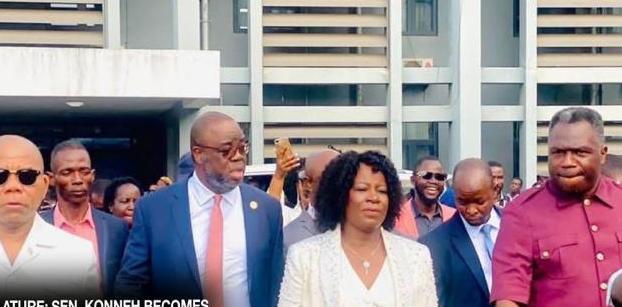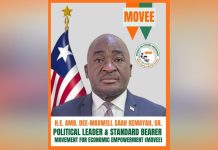Gerald C Koinyeneh
Africa-Press – Liberia. The Government of Liberia’s much-touted oil deal with Oranto Petroleum is facing escalating pushback at the Legislature, as more senators raise concerns over what they describe as weak fiscal terms, legal inconsistencies, and potential long-term risks to Liberia’s petroleum future.
Senator Amara M. Konneh of Gbarpolu County is the latest lawmaker to call for the outright rejection of the proposed Production Sharing Contracts (PSCs). Konneh, who chairs the Senate Public Accounts Committee, says the financial structure of the deal exposes Liberia to “serious fiscal and operational risks,” especially in how the signature bonuses are structured.
He argued that despite the Executive Branch announcing a signature bonus of US$3.75 million per block—a total of US$15 million—the PSCs only require Oranto to pay US$1.25 million per block within 120 days after ratification. The remaining US$10 million has no fixed deadline, as it is tied to future seismic work that experts say could take years—if it happens at all.
“This loophole allows the company to delay or avoid payments,” Konneh warned.
A Troubled Track Record
Konneh noted that Oranto Petroleum has a long history of nonperformance both in Liberia and across Africa. He recalled that in 2007, Oranto acquired offshore blocks in Liberia but never drilled a single well before selling the rights to Chevron, earning over US$100 million. Liberia, he said, received nothing from the transaction—not even jobs for Liberians, some of whom allege they were never paid for work done with the company.
Across Africa, Konneh added, Oranto and its parent company, Atlas Petroleum, have shown a recurring pattern of inactivity. In Uganda, Atlas held the Ngassa block for nearly a decade without drilling; the license was eventually canceled. In Senegal, Oranto holds the Saint Louis Offshore Profond block but has shown no meaningful progress, while the Equatorial Guinea contract was marred by years of inactivity with repeated extensions and little to no drilling.
Industry trackers such as Africa Intelligence have repeatedly reported the company’s failures.
“The pattern is clear—they secure acreage, make big promises, then walk away while profiting,” Konneh said.
Sierra Leone Sets an Example
Referencing developments in the region, Konneh urged Liberia to follow Sierra Leone’s lead. Just last week, Sierra Leone canceled the exploration license of Innoson Oil and Gas for failure to meet commitments. Konneh argued that Liberia must do the same with companies that lack credible track records.
‘Nothing to Fix’ — Konneh Urges Full Rejection
Konneh said the deal is beyond repair:
“All these issues—the long history of nonperformance, failed commitments, weak fiscal terms, and the lack of credible financial guarantees—point to one clear conclusion: Liberia cannot afford this deal. The only option is to reject it.”
He called on his Senate colleagues to send the contracts back to President Joseph Boakai for withdrawal.
“As someone who supports the President’s efforts to attract investment, we must partner only with companies that have proven operational and financial capacity. Liberia deserves partners with integrity, expertise, and real resources.”
Criticism Grows Across Legislature
Senator Konneh joins a growing bloc demanding the deal’s rejection. Earlier, former Speaker J. Fonati Koffa and Representative Musa Hassan Bility described the Oranto PSCs as a “corrupt and dangerous” agreement.
In a strongly worded communication to the Senate’s leadership committees in October, the two lawmakers urged their colleagues to return the deal to the Executive, citing a history of corruption-related allegations, poor transparency, Oranto’s failure to meet previous obligations and past violations reported by ProPublica, Global Witness, and Forbes
Koffa and Bility reminded the Senate that Oranto’s 2007 deal in Liberia was riddled with fraud and violations of the U.S. Foreign Corrupt Practices Act (FCPA). Oranto allegedly made more than US$150 million after flipping the blocks to Chevron through a “straw man” transaction involving the Canadian Overseas Petroleum Ltd. (COPL).
“If it looks like corruption, quacks like corruption, and smells like corruption, it must be corruption,” they wrote.
Senate Hearing Raises More Questions
Last week’s Senate hearing on the Oranto and TotalEnergies agreements raised fresh concerns. Instead of focusing equally on both deals, lawmakers zeroed in on Oranto’s controversial past, unresolved tax obligations, and the unclear benefits Liberia truly received when Oranto flipped oil blocks more than a decade ago.
Executives from the Ministry of Finance and Development Planning, Liberia Petroleum Regulatory Authority, National Oil Company of Liberia, and the Liberia Revenue Authority struggled to fully convince lawmakers, leaving many unanswered questions. Several senators said they remained unconvinced about Oranto’s financial capacity and its commitment to exploration.
Uncertain Fate Ahead
The Senate is expected to deliberate further in the coming days, but momentum appears to be shifting toward a possible rejection of the Oranto PSCs unless major changes or renegotiations occur.
The unfolding episode is shaping up as a significant political test for the Boakai administration, which has promoted the deal as a critical step toward reviving Liberia’s dormant petroleum sector.
Lawmakers, however, say they must protect Liberia from entering agreements that could mortgage the country’s future.
Source: FrontPageAfrica
For More News And Analysis About Liberia Follow Africa-Press






